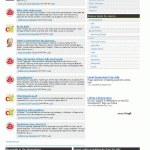Puffbox‘s latest project was unleashed today; working alongside Jeremy Gould at the Ministry of Justice, we’ve built a WordPress-based website in support of the Whitehall-wide programme of UK constitutional reform, going under the banner Governance of Britain.
As regular readers will know, I’ve started specialising in blog-powered websites which aren’t actually blogs. And this one is probably the least bloggy of the lot, so far. (For now, anyway; the functionality’s there when they want it.) At its heart is a ‘what’s new’ function, keeping track of the various announcements and consultations happening across Government. And as you’d expect, there are a few supplementary, ‘static’ pages explaining what’s going on.
There are a couple of ‘innovations’ (using the term rather loosely, I admit) worthy of note. One is the use of categorisation in the blog posts news updates. We’ve used WordPress’s notion of parent/child categories to build a list of subjects, and a list of departments. So if you want to see any announcements related to Parliament, let’s say, or announcements by HM Treasury, then there’s a page for that. And because it’s WordPress, you can access this ‘page’ as an RSS feed. (Which explains something I wrote a couple of weeks back…)
I’ve been trying to do something like this for a while; the implications for cross-government working are huge. You, in your Whitehall department, can write stuff into the Governance site; and we can pump it back to you in RSS format, for your own site to republish (if you want). In other words, it’s the ability to get the best of both worlds: a page on your own corporate site, and inclusion within the unified web presence. A real-world example of joined-up working… if your corporate site is able to process basic RSS. We do the hard part at our end; we can’t make it any easier for you. But I fear very few will be able to receive it. (Please prove me wrong, folks.)
The other ‘innovation’ is the page of ‘What others are saying‘, powered by del.icio.us. Technically, it’s just a republished RSS feed (um, see above). But I think it’s an important step for a government website to go out of its way to point to relevant stuff elsewhere – newspapers, magazines, blogs, anywhere online.
We’re using del.icio.us for a couple of reasons. One, because it’s a really nice way to save web links; and it delivers an easy-to-process RSS feed which we can integrate directly into our pages. (Yes, even our homepage.) But equally of course, this means we’re in the del.icio.us community – so if people want to tell us about pages we might want to read, they can do this via del.icio.us. Just tag it ‘for:governanceofbritain’, and we’ll see it in our ‘links for you’ inbox.
We’ve also hijacked some other blog functionality: for example, the list of ‘recent documents’ on the homepage is actually managed by the WordPress ‘blogroll’. Nothing particularly special or clever in that, but it provides an easy-to-use interface for non-technical people to keep that list up-to-date.
It all came together very quickly, almost too quickly; and it’s far from the prettiest site I’ve ever done. But again, it’s proof that you really can get from nought to a full-featured, multi-authored, two-way communicating, CMS-driven site in a couple of weeks. It’s a site which makes real efforts to engage with the rest of the web. And it tries a few things which might come off, and might not. We’ll all learn something as a result.

 I’m sitting here at 6pm on a huge day in politics. A political heavyweight has unexpectedly resigned, freeing up two seats at the Cabinet table. We’ve got all the usual fun and games of the ensuing reshuffle – who’s up, who’s down, who’s been snubbed – and widespread speculation about a merger of several government departments, with an impact on the Ministry of Defence. It’s Gordon Brown’s first resignation, and there’s a good argument to say this is
I’m sitting here at 6pm on a huge day in politics. A political heavyweight has unexpectedly resigned, freeing up two seats at the Cabinet table. We’ve got all the usual fun and games of the ensuing reshuffle – who’s up, who’s down, who’s been snubbed – and widespread speculation about a merger of several government departments, with an impact on the Ministry of Defence. It’s Gordon Brown’s first resignation, and there’s a good argument to say this is